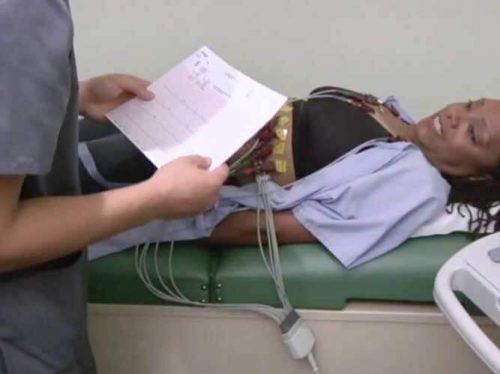What is an Electrocardiogram?
An electrocardiogram (ECG or EKG) is a test that checks for problems with the electrical activity of your heart. An ECG translates the heart’s electrical activity into line tracings on paper for a physician to review and interpret.
- Time: approximately 15 minutes

Why is it done?
Your doctor might request an electrocardiogram to:
- Check the heart’s electrical activity.
- Determine the cause of unexplained chest pain such as: heart attack, inflammation of the heart or angina.
- Finds the cause of your symptoms such as: chest pain, shortness of breath, dizziness, fainting or rapid irregular heartbeats (palpitations).
- Determine if the walls of the heart chambers are too thick (hypertrophied).
- Determine if you have had a heart attack in the past.
- Help predict if there are any blockages in your arteries.
- Monitor changes in your heart rhythm.
How do I prepare?
You can eat normally and take your medications, at their usual times, before the test. We recommend patients:
- Avoid caffeine 4 hours before the test including: tea, coffee, decaffeinated products, chocolate, soda pop or medications containing caffeine.
- Avoid smoking right before the test.
- Do not apply any lotions, creams or powders to the chest area prior to the appointment.
Wear comfortable clothing. You will be asked to remove upper clothing and any jewelry then change into a hospital gown before the test.
What happens during the test?
An ECG is performed by a certified technician.
- Electrodes (stickers) are attached to your skin.
- Wires are attached to the electrodes sticker.
- A computer records your hearts’ electrical signals and displays it as waves on paper.
- The resulting ECG is interpreted by a doctor (internist, family physician, cardiologist and/or surgeon).
Frequently Asked Questions
Can I eat before the electrocardiogram?
Yes. Fasting (not eating) is not required for this test.
Should I take my medications the day of ?
Yes. Take any medications on your normal, prescribed, schedule.
What should I wear for my test?
Wear comfortable clothing and, if possible, avoid wearing jewellery as you will be asked to remove it before the test. Please do not apply any lotions, creams or powders to your chest area.
Does it hurt?
No. There’s no pain associated with having an electrocardiogram. Some people may experience slight discomfort when the ECG stickers are removed.
How/When do I get my results?
Your test results will be sent to the referring physician and your family doctor. If a consultation has been requested, we will set up an appointment for you to speak to a cardiologist to discuss the results with you.
Are there any risks or side effects?
No. An ECG is quick and safe. No electricity is put into your body while the test is performed.
For Directions & Contact Information
See our other Services
Cardiac Consultation
An assessment of your heart health by a cardiac specialist
Cardiac Consultation
An assessment of your heart health by a cardiac specialist
Electrocardiogram (ECG/EKG)
Evaluates your heart function by measuring its’ electrical activity
Electrocardiogram (ECG/EKG)
Evaluates your heart function by measuring its’ electrical activity
Echocardiogram (echo)
Uses sound waves (ultrasound) to create pictures of your heart
Echocardiogram (echo)
Uses sound waves (ultrasound) to create pictures of your heart
Stress Test
Evaluates how well your heart works under stress - walking on a treadmill
Stress Test
Evaluates how well your heart works under stress - walking on a treadmill
Stress Echocardiogram
A stress test combined with an echo test. Evaluates your heart before and after exercise.
Stress Echocardiogram
A stress test combined with an echo test. Evaluates your heart before and after exercise
Holter & Loop Heart Monitoring
Records any abnormal electrical activity of your heart
Holter & Loop Heart Monitoring
Records any abnormal electrical activity of your heart
24Hr Blood Pressure Monitoring
Records your blood pressure over a 24 hour period
24Hr Blood Pressure Monitoring
Records your blood pressure over a 24 hour period
Chest Pain Clinic
Cardiac testing within 24 hours of a patients ER visit - in partnership with Windsor Regional Hospital
Chest Pain Clinic
Cardiac testing within 24 hours of a patients ER visit - in partnership with Windsor Regional Hospital
INR Clinic
A blood test that measures how long it takes blood to clot.
INR Clinic
A blood test that measures how long it takes blood to clot.
